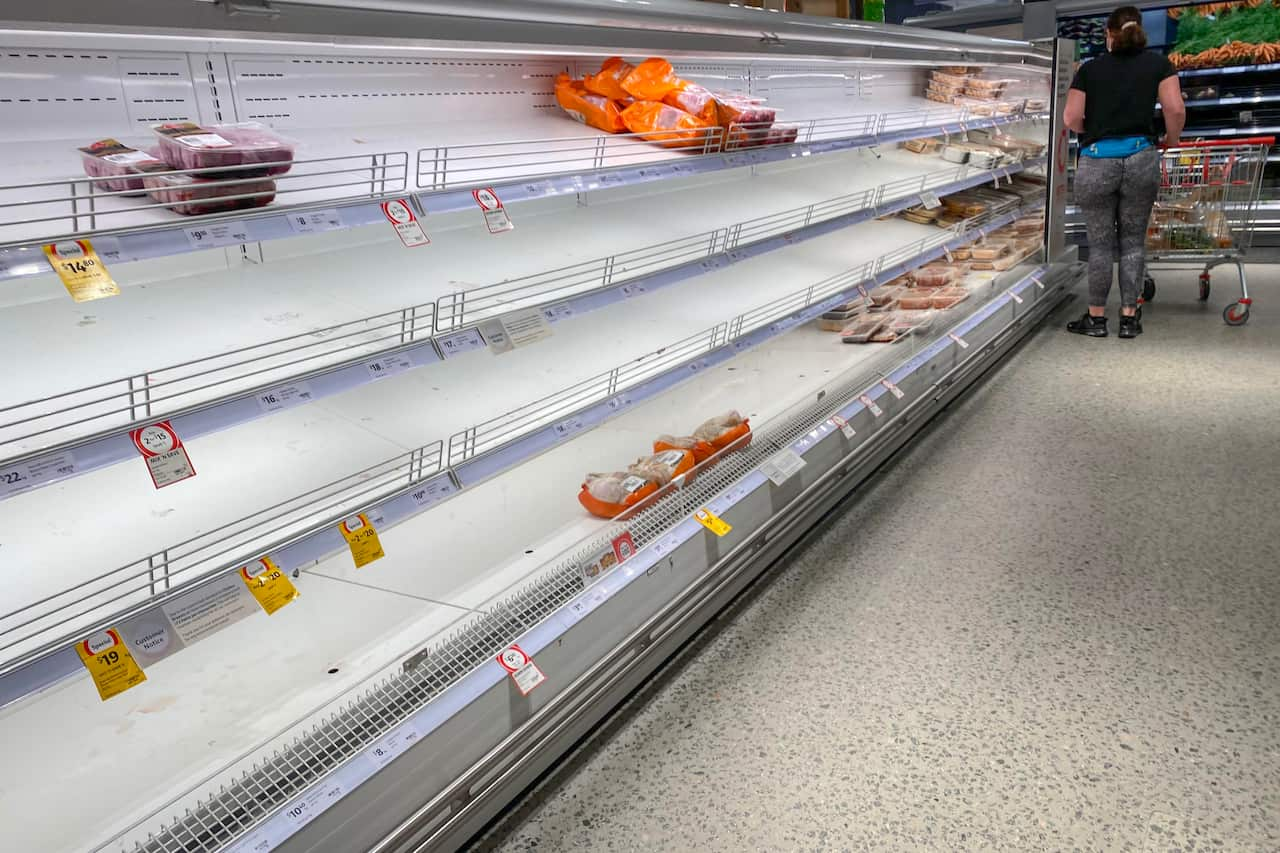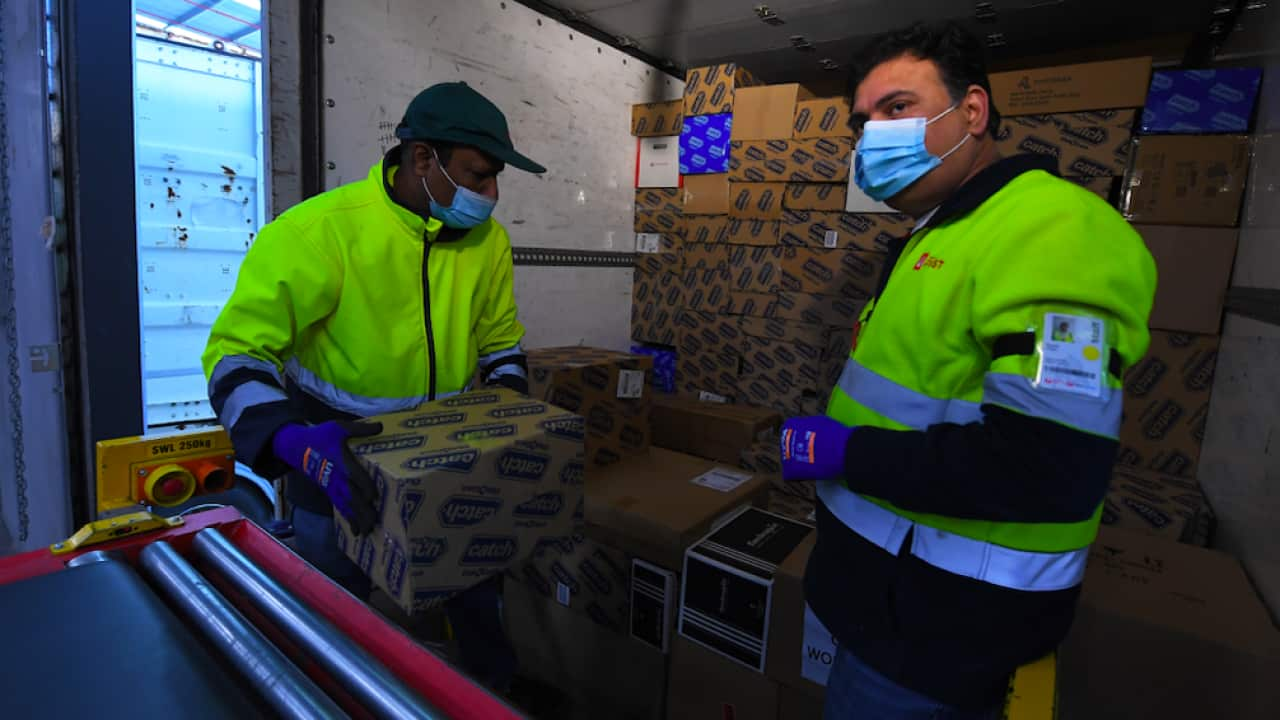Unions believe the decision to wind back close contact isolation requirements in order to keep critical workers at work is "reckless" and will threaten the health and safety of staff, while exacerbating supply chain disruptions.
NSW Health on Sunday announced changes to workplace restrictions in a bid to ease the impact of rising case numbers on the delivery of critical services.
Food logistics and manufacturing staff furloughed as close contacts are now allowed to leave self-isolation to attend work if they have no symptoms. They must wear masks and do daily rapid antigen tests (RATs).
NSW Health says they are only eligible to do so if employers determine their absence poses a high risk of disruption to the delivery of critical services or activities and they are unable to work from home.
New South Wales Premier Dominic Perrottet said the changes would help keep supply chains running over "challenging" weeks ahead.
"We believe that that will ease the pressure on supply and distribution networks, particularly for those essential areas across our state as we move through the next few weeks," he told reporters on Sunday.
Also on Sunday, Queensland Premier Annastacia Palaszczuk announced critical workers who may be quarantining at home but who haven't tested positive can continue to go to work in "certain circumstances".
"We need to keep the lights on, we need to keep the water supply going, we need to make sure our freight is moving and our food supplies go where they need to go to," she told the media.
The Transport Workers Union (TWU) is urging Prime Minister Scott Morrison to include unions in an urgent supply chain meeting to properly hear their concerns.
It says NSW Health's decision to wind back self-isolation requirements means employers will be able to prioritise operational matters over the safety of workers.
"Scrapping isolation requirements for transport workers is beyond reckless - workers are being thrown to the wolves by a government that continues to ignore all the warnings," TWU national secretary Michael Kaine said in a statement on Sunday.
"We know even if you're asymptomatic you can still spread the virus."
He said requiring potentially sick people to go to work won't make supply chains healthy.
"Sick drivers won't get stock onto supermarket shelves any faster but it will certainly help the virus hitch a ride across Australia," Mr Kaine said.
The Australian Council of Trade Unions (ACTU) said a decision to force potentially infected supply chain workers back to the front lines is "reckless" and "incredibly short sighted".
"The Australian Council of Trade Unions joins with the Transport Workers Union in urging Prime Minister Scott Morrison against proceeding with his reckless plan to force supply chain workers back to the front line despite being possibly infected with the COVID virus," ACTU Acting Secretary Liam O'Brien said in a statement.
"Forcing potentially infected staff back to work will only exacerbate the already rampant spread of the highly infectious Omicron strain throughout workplaces and the broader community, putting the safety of all Australians at risk."
A spokesperson for Woolworths, meanwhile, said the company welcomed the changes to isolation rules on Sunday.
"This is a proportionate response to challenges faced across the food and grocery supply chain, and the changes will assist us to continue to provide essentials to our customers," the spokesperson told SBS News.

Calls for free access to RATs for essential workers
While asymptomatic close contacts will be required to wear masks and take daily rapid antigen tests, the TWU says RATs alone don't offer enough protection as they won't pick up every COVID-19 case.
"Someone who is a close contact is by definition the greatest risk of passing it on - the NSW government is effectively scrapping the last buffer we had left to protect workplaces," Mr Kaine said.
"To rebuild a healthy workforce we need to have isolation requirements and rapid testing working together - we can't have one without the other."
He said the TWU wrote to the prime minister and national cabinet in September and October urging governments to provide rapid tests to road transport workers to avoid unnecessary delays and keep drivers on the road.
"Instead, we have a completely predictable scenario where drivers are delivering rapid tests to be sold on the shelves of supermarkets and pharmacies, but they, like most Australians, can't access them themselves," he said.
SDA national secretary Gerard Dwyer said this situation is the result of the prime minister's failure to plan or demonstrate genuine leadership.
"The prime minister must ensure as a matter of absolute immediacy priority access to free rapid antigen tests and appropriate PPE for essential frontline retail workers in stores and distribution centres," Mr Dwyer said.
"The authorities must act to give shoppers sufficient confidence to ensure retail workers do not become the targets of abuse and worse in the face of supply shortages of food and other essentials."
Health Minister Greg Hunt insists there is a progressive increase in RATs being made available with the Commonwealth having purchased 70 million, and more than 200 million when states and territories are included.
There has also been very significant private acquisitions, he said.
Mr Hunt said the Commonwealth is looking to supply the states with 10 million tests over the coming weeks, while more than five million have been supplied to aged care facilities.
"What we will see there are increasing volumes coming in through the combination of Commonwealth, state and pharmacy and supermarkets," he told reporters in Canberra via video-link.
But Opposition Leader Anthony Albanese said these issues are contrary to the statements that have been made by the NSW and federal governments.
"Everything isn't all okay in the health system in New South Wales," he told reporters in Ingham, Queensland.
"There are major issues with the pressure on the hospital systems. The 'Let it rip' approach is creating major issues in our health system, with people under such enormous pressure."
With AAP

